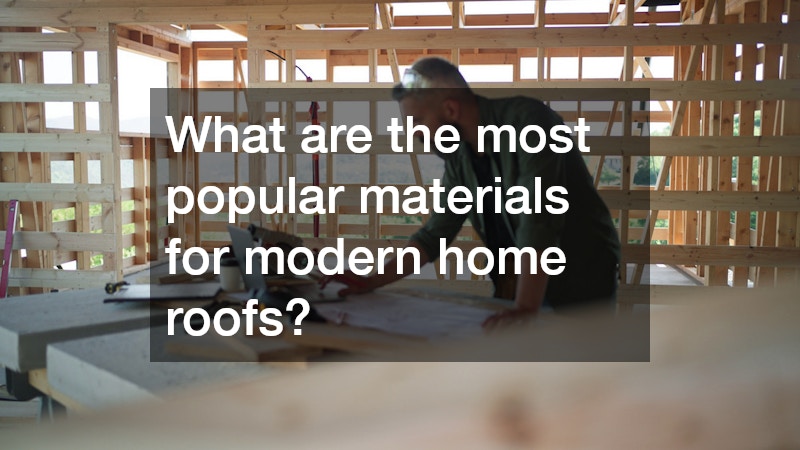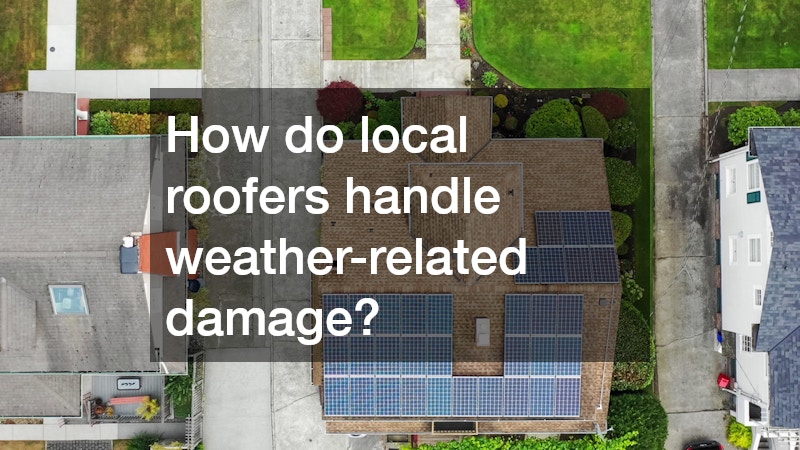Modern home roofs are an essential component of residential design, combining functionality, durability, and aesthetic appeal. Homeowners today expect roofing systems that can withstand diverse weather conditions while complementing the architectural style of their homes. Local roofers play a crucial role in installing, repairing, and maintaining these structures, offering expertise that ensures longevity and safety. Whether you require routine roof repair or a full replacement, a qualified roofer or roofing company can assess your needs, recommend suitable materials, and execute projects efficiently. Understanding how local roofers handle residential roofing not only helps homeowners make informed decisions but also underscores the importance of regular inspections, preventive maintenance, and skilled installation.
Modern roofing demands more than just basic protection; it involves energy efficiency, proper insulation, and design integration. Roofing contractors often advise on materials that align with climate considerations, budget constraints, and aesthetic goals. Additionally, working with local roofers ensures that projects comply with regional building codes and insurance requirements, mitigating potential risks. From simple roof repairs to complex replacements, professional roofers bring both technical knowledge and hands-on experience to each project. By examining the types of materials, assessment processes, and latest trends, homeowners can gain insight into how modern home roofs are managed and maintained effectively.

What are the most popular materials for modern home roofs?
Modern residential roofing incorporates a variety of materials, each chosen for durability, aesthetics, and performance. Asphalt shingles remain a popular option due to their affordability, ease of installation, and versatility in color and texture. Roof contractors often recommend asphalt shingles for homeowners seeking reliable protection without extensive costs, and local roofers can quickly replace damaged shingles to maintain the integrity of the roof. Additionally, they offer energy-efficient variants that reflect sunlight, helping to lower cooling costs.
Metal roofing is another widely adopted material, prized for its longevity, fire resistance, and sleek appearance. Roofers specializing in metal installation can tailor the material to fit contemporary home designs, whether standing seam panels or corrugated sheets. Metal roofs are especially effective in areas prone to severe weather, providing excellent water runoff and resistance to wind damage. When combined with professional roof repair services, metal roofs can last decades with minimal maintenance.
Eco-friendly options, including clay tiles, slate, and recycled synthetic materials, cater to homeowners seeking sustainability. Roofing companies increasingly promote green roofs or solar-integrated systems, combining modern design with environmental responsibility. Local roofers familiar with these materials can advise on proper installation techniques, weight distribution, and long-term care. By understanding material options, homeowners can balance aesthetics, cost, and performance while ensuring their modern home roofs are prepared for years of reliable service.

How do local roofers assess the condition of a roof?
Roof inspections and evaluations are a critical first step in managing residential roofing projects. Local roofers conduct thorough assessments, identifying potential weaknesses, leaks, or structural concerns before they escalate. This includes checking shingles, flashing, gutters, vents, and underlayment, ensuring that all components meet performance standards. A detailed inspection allows roof contractors to develop a repair or replacement plan tailored to the specific needs of the home.
Technology plays an increasing role in roof assessments. Drones, infrared cameras, and moisture sensors enable roofers to detect hidden damage without invasive procedures. These tools help pinpoint areas of wear and tear, including water intrusion or compromised insulation, which may not be visible from ground-level inspections. Advanced diagnostics also streamline roof repairs, allowing roofing companies to allocate resources efficiently and minimize disruption to homeowners.
Signs of roofing wear and tear vary depending on material and age. Curling, cracking, or missing shingles, rust on metal roofs, and sagging or uneven areas indicate potential issues requiring attention. Local roofers are trained to distinguish minor concerns from those that could necessitate full replacement. By combining visual inspections with modern technology, roof contractors ensure that residential roofing remains safe, durable, and functional for decades.
What steps are involved in a complete roof replacement?
The preparation and permitting process is the foundation of any roof replacement. Local roofers begin by assessing the existing structure, verifying compliance with building codes, and securing necessary permits. A reputable roofing company coordinates inspections and documentation, ensuring that replacement projects meet legal and safety requirements. This step also involves scheduling deliveries, arranging equipment, and preparing the property to minimize disruption.
Removal of old roofing is executed carefully to prevent damage to the underlying structure. Roof contractors systematically strip shingles, tiles, or metal panels, disposing of materials responsibly. Local roofers take care to protect landscaping, driveways, and other property features during demolition, demonstrating attention to detail and professionalism. Proper removal ensures that the new roofing materials have a stable and clean foundation, which is essential for long-term performance.
Installing new roofing material involves precise alignment, fastener placement, and sealing techniques. Roofing companies follow manufacturer specifications and industry best practices, whether installing asphalt shingles, metal panels, or eco-friendly alternatives. Local roofers coordinate with insulation specialists, waterproofing services, and other trades to integrate ventilation, flashing, and drainage systems seamlessly. The result is a modern home roof that meets aesthetic, structural, and energy efficiency standards, providing homeowners with peace of mind.
How do local roofers handle weather-related damage?
Identifying weather damage promptly is crucial for preventing long-term issues. Local roofers inspect for missing shingles, dented metal panels, leaks, and compromised flashing after storms, hail, or high winds. Early detection allows roof contractors to plan repairs effectively, reducing the risk of water intrusion and structural decay.
Emergency repairs and solutions are a core part of a roofing company’s service offering. Temporary patches, tarps, and fast repairs protect homes until a full restoration can be completed. Roofers prioritize safety while maintaining speed and efficiency, especially when multiple properties are affected in the wake of severe weather.
Preventive maintenance strategies help homeowners minimize the impact of future weather events. Local roofers provide guidance on reinforcing vulnerable areas, applying protective coatings, and maintaining gutters and downspouts. Regular inspections and proactive care ensure that modern home roofs withstand environmental challenges while reducing the need for costly roof repairs.
What are the signs you need roof repair vs. replacement?
The age and lifespan of roofing materials are key indicators in deciding between repair and replacement. Asphalt shingles generally last 20–30 years, metal roofs up to 50 years, and eco-friendly materials vary based on composition. Local roofers assess the remaining life expectancy and recommend solutions that maximize value and performance.
The extent and severity of damage also influence the decision. Isolated leaks, minor shingle loss, or small cracks may only require roof repair, while extensive warping, rust, or water damage might necessitate full replacement. Roofing companies use professional judgment to balance cost and effectiveness, ensuring homeowners receive appropriate solutions.
A cost-benefit analysis considers immediate repair expenses against long-term investment in a new roof. Roof contractors provide transparent estimates for both options, factoring in labor, materials, and potential future maintenance. By evaluating these factors, homeowners can make informed decisions that protect both property and budget.
How can you maintain and extend the life of a modern home roof?
Establishing a regular maintenance schedule is essential for prolonging roof life. Local roofers recommend seasonal inspections, gutter cleaning, and minor repairs to prevent larger issues. Routine upkeep helps identify wear and tear early, ensuring timely roof repairs and reducing the likelihood of expensive replacements.
Cleaning and debris removal also play a critical role. Leaves, branches, and dirt can trap moisture, promote mold growth, and damage roofing materials. Roofing companies advise using proper cleaning methods to preserve integrity while avoiding scratches or dislodging shingles.
Ensuring proper ventilation reduces heat and moisture buildup, which can accelerate material deterioration. Roof contractors integrate attic vents, ridge vents, and insulation solutions to maintain airflow. Combined with regular inspections and professional maintenance, these practices help modern home roofs achieve maximum longevity.

What role does insulation play in modern home roofing?
Types of roof insulation, including foam, fiberglass, and reflective barriers, contribute to energy efficiency and comfort. Proper insulation minimizes heat loss in winter and reduces cooling demands in summer, helping homeowners save on energy bills. Local roofers often coordinate insulation installation alongside roof repairs or replacements to ensure seamless integration.
Impact on energy efficiency is significant, as well-insulated roofs reduce HVAC strain and prevent temperature fluctuations. Roofing companies evaluate insulation thickness, R-values, and ventilation to optimize performance. Energy-efficient modern home roofs enhance overall sustainability while providing year-round comfort.
Insulation installation techniques vary by material and roof type. Roof contractors may use spray foam, rolled batts, or rigid panels, adjusting methods to match slope, structure, and ventilation needs. Professional installation prevents gaps, settling, and moisture intrusion, ensuring insulation effectiveness for decades.
How do local codes and regulations affect roofing projects?
Understanding local building codes is essential for compliance and safety. Roof contractors must adhere to height restrictions, fire ratings, and structural requirements specific to each jurisdiction. Local roofers navigate these regulations to avoid fines, delays, or insurance complications.
The permitting process for roofing projects involves submitting plans, scheduling inspections, and securing approval before work begins. Roofing companies handle these administrative tasks to streamline project execution. Ensuring permits are in place protects homeowners and contractors while maintaining project legality.
Insurance and liability considerations are also crucial. Local roofers carry coverage for workers, property, and potential damage, providing peace of mind to clients. Proper documentation and adherence to regulations mitigate risk during repairs, replacements, or new construction.
What are the latest trends in modern home roof design?
Innovative roofing materials, such as solar-integrated panels, reflective coatings, and composite shingles, are shaping modern home roofs. Roofers increasingly adopt these solutions to enhance durability, efficiency, and sustainability. Roofing companies guide homeowners in selecting materials that complement the style while meeting performance standards.
Sustainable and green roofs, including vegetative systems and energy-efficient designs, are gaining popularity. Local roofers collaborate with architects and engineers to implement these eco-friendly solutions, offering long-term energy savings and environmental benefits.
Architectural styles and aesthetics influence material choice, color palettes, and roof slope. Roof contractors integrate functionality with design, ensuring modern home roofs contribute to curb appeal and structural harmony. Staying informed about trends allows homeowners to achieve a roof that is both stylish and high-performing.

What should homeowners consider when choosing a local roofer?
Evaluating experience and expertise ensures the selected roofing company can handle residential roofing effectively. Roofers with proven track records, certifications, and knowledge of modern home roofs offer reliable services and skilled workmanship.
Checking licenses and certifications verifies compliance with state and local regulations, providing assurance of professionalism. Roofing contractors with appropriate credentials are better equipped to manage safety, permits, and insurance requirements.
Reviewing references and testimonials gives insight into quality, reliability, and customer satisfaction. Local roofers with positive feedback often demonstrate responsiveness, professionalism, and attention to detail. Homeowners who research carefully increase the likelihood of a successful roofing project with minimal complications.
Conclusion
Modern home roofs require careful planning, skilled installation, and ongoing maintenance to remain both functional and visually appealing. Local roofers and roofing companies provide the expertise necessary to handle roof repairs, full replacements, and specialized residential roofing projects, ensuring that every step—from material selection to final inspection—is executed with precision. By selecting suitable materials, performing detailed inspections, adhering to building codes and regulations, and implementing preventive maintenance strategies, homeowners can extend the life of their roofs while enhancing safety, energy efficiency, and overall property value. Whether working with asphalt shingles, metal roofing, or eco-friendly solutions, professional roof contractors ensure that modern home roofs meet both aesthetic and functional standards, complementing the architectural style of the home while withstanding harsh weather conditions.
Collaborating with experienced local roofers offers peace of mind, reduces unexpected costs, and guarantees that residential roofing projects are executed efficiently, safely, and to the highest quality. Beyond installation and repair, these roofing professionals often provide ongoing guidance on maintenance, seasonal inspections, and timely interventions to prevent minor issues from becoming major problems. Homeowners benefit from their knowledge of the latest roofing technologies, sustainable materials, and innovative designs, ensuring that each roof is not only durable but also aligned with modern trends in residential construction. Ultimately, investing in professional roofing services is an investment in the longevity, safety, and beauty of the home, giving homeowners confidence that their property is protected and well-maintained for years to come.
